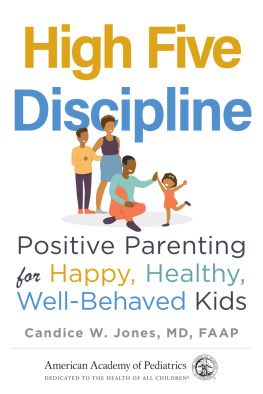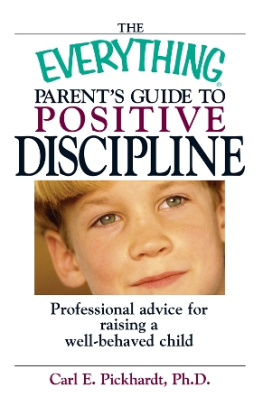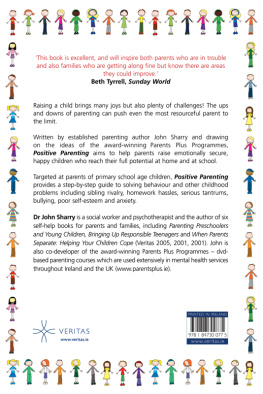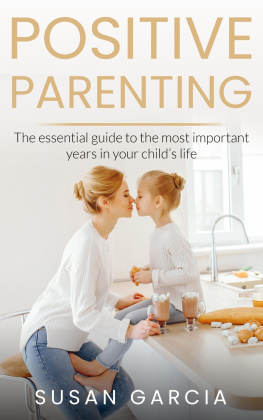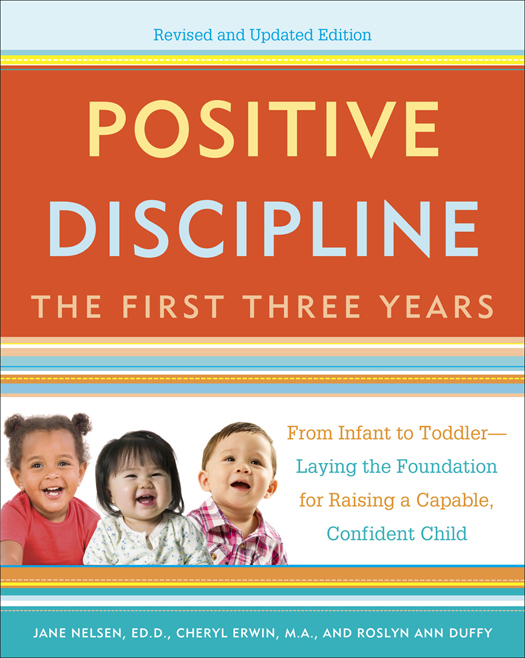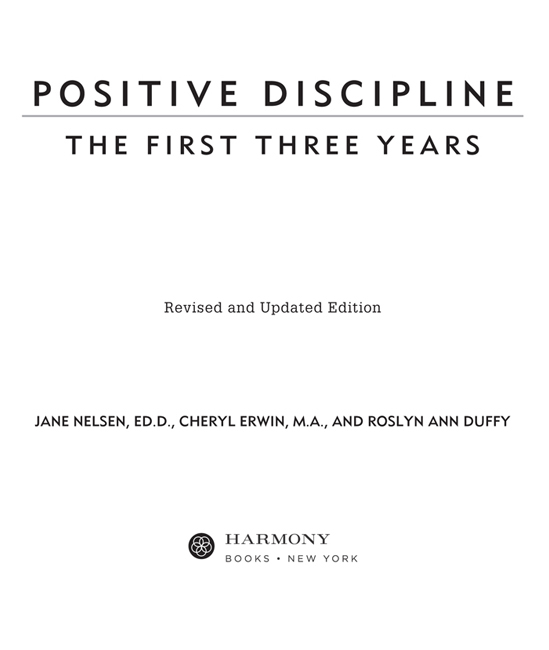ALSO IN THE POSITIVE DISCIPLINE SERIES
Positive Discipline
Jane Nelsen, Ed.D.
Positive Discipline for Teenagers
Jane Nelsen, Ed.D, and Lynn Lott, M.A.
Positive Discipline for Preschoolers
Jane Nelsen, Ed.D., Cheryl Erwin, M.A., and Roslyn Duffy
Positive Discipline for Children with Special Needs
Jane Nelsen, Ed.D., and Lynn Lott, M.A.
Positive Discipline in the Classroom
Jane Nelsen, Ed.D., Lynn Lott, M.A., and H. Stephen Glenn
Positive Discipline: A Teachers AZ Guide
Jane Nelsen, Ed.D., Roslyn Duffy, Linda Escobar, Kate Ortolano, and Debbie Owen-Sohocki
Positive Discipline AZ
Jane Nelsen, Ed.D., Lynn Lott, M.A., M.F.T., and H. Stephen Glenn
Positive Discipline for Single Parents
Jane Nelsen, Ed.D., Cheryl Erwin, M.A., and Carol Delzer
Positive Discipline for Step Families
Jane Nelsen, Ed.D., Cheryl Erwin, M.A., and H. Stephen Glenn
Positive Discipline for Parenting in Recovery
Jane Nelsen, Ed.D., Riki Intner, and Lynn Lott, M.A.
Positive Discipline for Childcare Providers
Jane Nelsen, Ed.D., and Cheryl Erwin, M.A.
Positive Discipline for Working Parents
Jane Nelsen, Ed.D., and Lisa Larson
Positive Time-Out: And Over 50 Ways to Avoid Power Struggles in the Home and the Classroom
Jane Nelsen, Ed.D.
Copyright 1998, 2007, 2015 by Jane Nelsen, Cheryl Erwin, and Roslyn Duffy
All rights reserved.
Published in the United States by Harmony Books, an imprint of the Crown Publishing Group, a division of Random House LLC, a Penguin Random House Company, New York.
www.crownpublishing.com
Harmony Books is a registered trademark, and the Circle colophon is a trademark of Random House LLC.
Originally published in hardcover in the United States by Prima Publishing, Rocklin, CA, in 1998. Subsequent edition published by Harmony Books, an imprint of the Crown Publishing Group, a division of Random House LLC, New York, in 2007.
Library of Congress Cataloging-in-Publication Data
Nelsen, Jane.
Positive discipline : the first three years / by Jane Nelsen, Cheryl Erwin, and Roslyn Ann Duffy.
pages cm
Revised edition of the authors Positive discipline : the first three years : from infant to toddlerlaying the foundation for raising a capable, confident child.
Includes bibliographical references.
1. Discipline of children. 2. ToddlersDiscipline. 3. Parenting. 4. Child rearing. I. Erwin, Cheryl. II. Duffy, Roslyn. III. Title.
HQ770.4.N437 2014
649.122dc23 2014045390
ISBN 978-0-8041-4118-5
eBook ISBN 978-0-8041-4119-2
Illustrations by Paula Gray
Jacket design by Nupoor Gordon
Jacket photographs: (left to right) Rubberball/Getty Images; Gelpi JM/Shutterstock;
Joakim Leroy/E+/Getty Images
v3.1
CONTENTS
INTRODUCTION
PARENTS HAVE BEEN raising children since the dawn of time. You might wonder what could have changed in the sixteen years since Positive Discipline: The First Three Years was originally published. The basic Positive Discipline concepts remain the same. Still, we discovered through our own studies and work with families that much of what we know and understand about young children has indeed grown and shifted in recent years. There is now more and more brain research that validates what we teach, and the world we live in has changed, too9/11 and technology being two examples.
Many things will never change: young children will always need unconditional love, encouragement, skills, supervisionand lots of patience. In other areas, however, we are still learning. Technology has become more sophisticatedand more invasiveand we do not yet fully understand its impact on young children and their families. Parents have shared new stories with usand we are happy to share them with you. We are grateful to have the opportunity to update and revise this book so it can be even more useful to parents just setting out on the amazing and sometimes challenging journey of parenting.
Some parents have commented over the years on the title of this book. How, they ask, can you even talk about discipline in the first years of life? Why would parents need to punish infants and toddlers? As you read, you will discover that we do not advocate punishment at all, for any age. Instead, we believe in discipline that teaches young children in a kind, respectful, and gentle manner; discipline that imparts valuable social and life skills as a foundation for success in relationships and in life itself. Punishment is designed to make kids pay for their mistakes (even when they are not truly mistakes but come under the heading of developmentally appropriate behavior). Positive Discipline is designed to help children learn from their mistakes in a loving and supportive atmosphere.
Above all, we believe in loving, connected relationships that form the enduring bond between a parent and his or her child. A new and important theme of Positive Discipline is connection before correction. The connection you create with your little one is by far your most valuable parenting tool; everything else depends on the quality of the relationship you share together. When we hear parents say, Well, that Positive Discipline tool didnt work, we have to wonder if these parents are using the tools to win power struggles or if they truly understand the principles behind the toolsthe foremost of which is that connection always comes first.
In this edition we place greater emphasis on the beliefs children are forming about themselves based on their perceptions of their daily experiences: these beliefs provide the fuel for their behavior. Children who grow up in an environment of excessive control or an environment of permissiveness will form different beliefs than those who are raised in an environment of kindness and firmness at the same time. Understanding the belief behind the behavior is foundational to understanding how to motivate changeand accepting that it might take as long to help children change their beliefs as it took to form those beliefs in the first place. Positive Discipline is not about quick fixes but about creating an environment where children can make healthy decisions that will serve them throughout their lives.
As parents who have raised families and watched their children embark on their own lives and journeys, we can tell you that what remains, after all the tantrums, sleepless nights, mistakes, and worries that come with raising little ones are done, is love . When all else fails and you dont know what to do, fall back on love. Love and your own inner wisdom will help you know what to do.
It is our hope that this book will become a valuable friend and guide as you share these busy and exciting years with your child. Dont be afraid to ask questions or to learn new skills and ideas. It takes courage to raise a child; it also takes courage to be one. Take time to savor these first three wonderful years; they will pass all too quickly.
PROLOGUE:
By the Children
I am Serena. I am three months old. I know my mothers voice, I look for her face, and I love to snuggle when she picks me up. I like to drink my milk. I cry when she isnt ready to give me my milk on time. When my mother rocks me to sleep, I like to look around. I like to take my bath but I dont like it when she washes my hair or face. I like it when people talk to me, laugh out loud, and play with me. I want to hold my toysbut I cant yet. I like to go out every day because I want to know what is going on. I watch everything.


